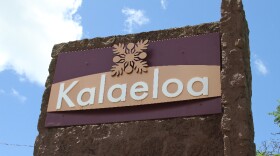The owner of a Kāneʻohe Bay property is one step closer to building an adult residential facility — which some nearby residents are calling a "monster house."
The property at 44-667 Kāneʻohe Bay Dr. would be replaced with Hale Mahinui, a care home for older adults.
Honolulu's Department of Planning and Permitting approved a conditional use permit, also known as CUP, which gives the project a zoning exemption as long as it meets certain requirements.
However, neighbors are contesting the department's decision.
"It allows for a two-story, 24-unit commercial facility without any precedent in our community," said Rosie Goo, who lives behind the proposed project on Kuono Place.
"It's really in that vein of 'monster homes' that are coming up all over our island," Goo said.
Goo is among nearly two dozen neighbors appealing DPP's decision to issue the CUP. They argue the department cut corners in approving the development by not taking into account its own policies for oversized developments in residential areas.
The neighbors also claim the department didn't follow the Koʻolaupoko Sustainable Communities Plan, Oʻahu General Plan, and the city's land use ordinance.
"We are not against care homes, and we are not against housing our elderly. But we are for orderly development that follows established policies," said Goo.
The property is located roughly a quarter mile away from the shore of Kāneʻohe Bay, and borders a special management area. The proposed 12,000 square foot facility would be nearly six times the size of neighboring properties.
Like many other Oʻahu residents living next to larger developments, neighbors are concerned about traffic, parking and sewage infrastructure.
"The Board of Water Supply did approve the CUP, but they base the infrastructure on existing usage, not future usage," said Ellen Watanabe, who lives next to the project site.
"They approved it without a traffic study, which was recommended that anyone applying for the CUP do," Watanabe said. "I mean, DPP ignored a lot of the procedures and rules that are in place."
Another concern of theirs is runoff. Goo said the city was sued in the past, due to the runoff from developments mauka of the proposed site.
"So [DPP] supposed to mitigating all of those issues. They haven't even done that. So why greenlight this facility without addressing all those issues that already currently exist?" Goo asked.
DPP director Dawn Apuna told HPR she granted the CUP because the project complies with the city's land use ordinance and "other standards." If the applicant fails to comply with any of the permit's conditions, the director could take action, such as halting operations or pulling the permit, until those terms are either met or modified.
While residents argue the development is similar to a "monster home," Apuna said the city's laws against oversized developments don't apply here. That's because the project is a group living facility, which is not regulated under the city's residential district development standards.
The city's zoning board of appeals consolidated three appeal filings from residents to be heard on Thursday, March 23 at 3 p.m.
This would be the last time residents can object to the department's decision through the public process.
If the board votes in favor of the city, residents could seek injunctive relief through the Circuit Court. But neighbors tell HPR it would be a "lose-lose situation," because fighting the city in court, using taxpayer dollars, would put an additional financial strain on them.







